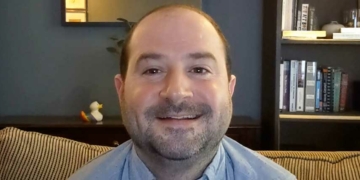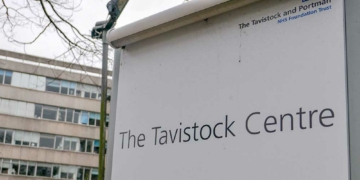The Labour MP for Canterbury, Rosie Duffield, has been at the centre of a storm in the party about women’s rights and transgender demands. Some of her critics sought to have her deselected and others chose to bombard her with threats of extreme violence. Jo Bartosch spoke to her about how the controversy has affected her life and the way forward.
Rosie Duffield MP is not one to follow the crowd. In 2017, when the Labour Party were on the brink of sliding into irrelevance, Duffield won a surprise victory over Conservative Julian Brazier who had represented the constituency of Canterbury for over three decades. The only red MP in the blue sea of Kent, Duffield now holds the line for the Labour Party in the area.
Duffield is disarmingly warm. She tells me one afternoon over Zoom that as child she was drawn to politics and current affairs, recalling:
“I was like that chubby puppy in 101 Dalmatians, glued to the television when my dad was watching the Brian Walden Show on Sunday mornings. As soon as I was old enough, I became an activist; I never thought of myself as a campaigner, I just did it.”
Duffield’s approach is down-to-earth and pragmatic; central to her philosophy is the belief that people’s shared humanity is more important than the differing views they might hold. To Duffield, the polarising nature of debate on social media inhibits understanding, she prefers real life conversation:
“I talked to Leave voters who don’t especially agree with my stand on Brexit, but we come to some kind of understanding and that’s how adults behave isn’t it?”
Duffield’s detractors tend not to share her balanced approach, and she has received extreme online abuse from those who believe she is transphobic. The accusations started in July 2020, when broadcaster Piers Morgan queried why a report from CNN had used the phrase “individuals with a cervix”. Duffield signalled her agreement with Morgan by ‘liking’ his tweet which read “do you mean women?” This tiny action was spotted by one of her constituents who accused her of transphobia. Duffield replied by asking “I’m a ‘transphobe’ for knowing that only women have a cervix . . . ?!” In response, some of her critics sought to have her deselected and others chose to bombard her with threats of extreme violence. Whilst she received open support from her friend Jess Phillips MP and “support in secret” from unnamed others within the Labour Party, some of her colleagues, including Angela Rayner MP, admonished her.
Duffield dismisses the trolls she endures online, describing them as “like annoying little gnats”, she has suffered far more than obnoxious tweets. In 2019 she moved MPs to tears with a powerful, heartfelt speech about her own experience of domestic abuse. She tells me living with an abusive man has made her adamant that she “will not shut” her “female mouth again.”
“It reminds me of the fear that gay friends of my family lived with during the 1980s, when they were scared to express themselves, they weren’t allowed to be ‘out.’ And like gay rights, women’s rights have been hard fought for; it has taken us years to get a seat at the table. To now be told we’re not allowed to talk about our rights is chilling.”
The issue for many on Duffield’s side of the argument is simple; it comes down to sex. Men as a group are more violent than women. Evidence suggests this pattern of violence does not change when men identify, often later in life, as transwomen. Being on average larger, stronger and more likely to commit criminal acts, to protect females over many years feminists have fought for single-sex spaces, including refuges, toilets and hospital wards. Allowing entrance to these on the basis of an individual’s gender identity rather than their biological sex, puts women and girls at risk. With the numbers of people identifying as ‘trans’ growing it is becoming more common for services to be offered on the basis of gender identity, and the women impacted by this are rarely asked. This is at the heart of Duffield’s concerns, though she admits “I don’t know what the solution is.”
She tells me:
“As a woman you particularly feel frightened, your hackles go up straight away when you’re threatened with no-platforming or being shut down. The narrative, whether it’s physical or not, is always be quiet. Stop speaking, what you’re saying is wrong.
“It reminds me of the fear that gay friends of my family lived with during the 1980s, when they were scared to express themselves, they weren’t allowed to be ‘out.’ And like gay rights, women’s rights have been hard fought for; it has taken us years to get a seat at the table. To now be told we’re not allowed to talk about our rights is chilling.
“And why is it women that we’re expected to be quiet about? I am absolutely pro-trans rights. I think everyone I know is, but I’m also very wary of the discussions taking place about women’s rights and how those seem to be dismissed very easily at the moment. I am really worried.”
Duffield suspects most of those who attack her for her stance are simply men who are enraged that women might seek to have their own spaces and services. She notes:
“They are almost always men who don’t even seem to come from the trans community… it’s astonishing, the same level of outrage is never expressed about arms deals or genocide! And other campaigns I’m involved with, like my support of refugees, don’t attract the same level of vitriol. Some men seem really threatened by women speaking up for our rights.”

Rosie Duffield, Labour MP for Canterbury
Progress in the Labour Party is a slow process, and Duffield believes this is in part because the membership is so large.
“Jewish friends are saying they’ve seen a change since Keir Starmer has taken charge, and that’s great news. But wider progress is not going to be overnight or instant. I’ve had members of my own local party who submitted complaints several years ago that still haven’t been resolved. I think misogyny is probably harder to prove as a concept than most other forms of discrimination, it’s particularly tough to explain to men who have never lived through it.”
She is proud of the Labour Party schemes such as All Women Shortlists and the Jo Cox Women in Leadership programme, of which Duffield was one of the first graduates. Duffield says she wasn’t aware of the problems with gender self-identification when she was admitted onto the Jo Cox Programme, but that now she thinks a solution must be found so that a parity between the sexes is achieved whilst being mindful of people who identify as transgender. Duffield feels strongly that the next leader ought to be a woman:
“Women make up 51% of the Parliamentary Labour Party, and most of our membership. It is high time we had a woman leader.”
What was deemed a fall from grace by transgender activists was a welcome moment of relief for many feminists. Over the past few years, women within the Labour Party have faced expulsion and harassment for trying to highlight a clash between the sex-based and gender identity-based rights. Reflecting on the messages of thanks received, Duffield says:
“I think there’s an appetite for discussion within the Labour Party and I feel that more people are willing to be bolder. I was sent over a thousand positive and kind emails when I started getting the abuse in the summer, I got something like seven complaint emails and that just showed me that people were like, ‘Wow, you’ve spoken about women and women’s rights here’. I know it can be particularly tough to stand up about contested issues as a member of the public, but as an MP, that’s what you’re there for.
“The key thing for some people was just the right to have an honest discussion. There’s also quite a lot of support on the platforms where I also get all the hate. That’s been reassuring. All parties seem to be massively divided on this, but I think people are beginning to understand that this is a discussion we need to have.”
“How have we reached the point where we are having to fight to be able to access single sex Rape Crisis Centres and domestic abuse refuges? Who decided that its now OK to call women ‘cervix-havers’? I want there to be that discussion rather than for partisan organisations that are paid for by local councils to write policy.”
Looking across the pond, Duffield believes there are lessons for the Labour Party.
“I was watching Megyn Kelly interviewed when Biden and got elected. Her main piece of advice to the new administration was be not to get too bogged down in identity politics because the Republican voters can’t bear it. I think there’s a lesson for the Labour Party in that.”
“We’ve got five million children living in poverty whilst we’re arguing amongst ourselves and the Tories are sitting back and loving it. When you knock on doors people want action on the issues that matter to them, not these kind of ideological academic arguments on social media. So, I think we’ve got to be wary of trying to be too popular on those platforms rather than actually getting on with what people need. We need to learn lessons from why we were rejected last time.”
For Duffield freedom of speech and feminism go hand-in-hand, and she is vehemently opposed to no-platforming, which she describes as “leading to ignorance.” She believes that the issue of gender identity has taken over discussions on social media, and that the wider implications for civil society have not been thought through:
“How have we reached the point where we are having to fight to be able to access single sex Rape Crisis Centres and domestic abuse refuges? Who decided that its now OK to call women ‘cervix-havers’? I want there to be that discussion rather than for partisan organisations that are paid for by local councils to write policy.”
Today, Duffield is proud to stand alongside women who are both to her left and right politically. She expresses anger about the treatment of Women’s Place UK (WPUK), a group founded by left-wing activists and trade unionists concerned about the erosion of women’s sex-based rights. A statement signed by all the Labour leadership candidates bar Keir Starmer condemned WPUK as a hate group; Duffield laughs at the suggestion that this left-wing group of women are funded by right-wing Evangelical Christians.
“A lot of the women that are really at the heart of this particular issue are much more far-left than me in the party. For example, I find myself standing alongside those who supported Jeremy Corbyn; it’s really brought us together as feminists.”
Duffield is adamant that sex matters in the fight against sexism:
“What unites women, wherever we are and whatever our viewpoints, is our lived experience as women.”
On starting the discussion with Rosie Duffield I suspected she might be a careerist hiding behind feminism. I surmised that perhaps she’d seen the damage to the left from identity politics and was carving out another route for herself. By the end I felt rather ashamed of my knee-jerk cynicism, Duffield clearly cares about both those she represents and is prepared to weather attacks from all sides in defence of free speech. Duffield is a rare breed in politics, a person who puts principle above popularity; if others followed her example Parliament would be the better for it.
Jo Bartosch is a writer and campaigner for the rights of women and girls.
Photo credit: UK Parliament
























I've been a Labour Party member for over 50 years but if the gender fanatics succeed in getting rid of Jo Duffield - I'm gone.
Wish she was my MP!
Like Jo Bartosch I have been cynical about MP's careerism, and it is refreshing to hear of an MP who stands by her convictions, however unpopular they might make her with some factions of her party.